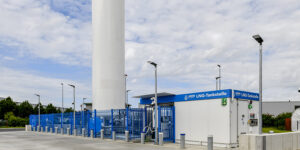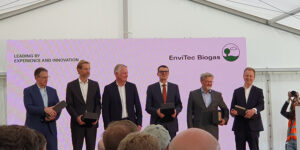Liqvis GmbH has embarked on a mission to decarbonise Heavy Goods Vehicles, recognising the importance of collaboration in achieving this ambitious objective. As a subsidiary of Uniper based in Essen, Liqvis has devised an innovative approach to significantly reduce CO2 emissions: bio-LNG. Silvano Calcagno, a seasoned member of the Liqvis management team since 2017, is well-versed in the intricacies of this alternative fuel and its potential impact on decarbonisation efforts.
Explaining the advantages of LNG or bio-LNG over conventional fuels such as diesel, Calcagno emphasises their environmental and operational benefits for both the planet and HGV drivers. “The focus is primarily on CO2 reduction, which is crucial in combating climate change,” he elaborates. “Fossil LNG can reduce CO2 emissions by up to 30 percent, while bio-LNG can achieve up to 100 percent reduction compared to diesel-powered HGVs.”
With bio-LNG, HGVs can achieve complete CO2 neutrality on the roads despite using combustion engines. This is due to the negative CO2 value of bio-LNG, as Calcagno explains: “The vehicle emits only the CO2 that has already been removed from the environment, making the HGVs operate in a CO2-neutral manner.” Given its pivotal role in decarbonisation, Liqvis GmbH aims to transition its network of filling stations entirely from LNG to bio-LNG.
Calcagno underscores the importance of sourcing advanced bio-fuel from residual and waste materials, highlighting a significant milestone achieved in mid-2023 with the opening of Germany’s largest bio-LNG plant in Güstrow by partner EnviTec. Liqvis GmbH, with its 14 LNG filling stations nationally and abroad, stands as the largest buyer of bio-LNG from this facility.
The production of bio-LNG from biomethane extracted from dried chicken manure exemplifies a circular economy approach, with EnviTec Biogas AG collaborating with Landei, Germany’s largest egg producer. This demonstrates the potential for bio-LNG to be derived from various waste streams, further enhancing its environmental credentials.
Despite the transition to bio-LNG, Calcagno assures that the process remains seamless for both filling stations and vehicles. Safety regulations must be adhered to due to the cryogenic properties of LNG, but drivers appreciate the quieter and smoother operation of LNG-powered HGVs.
Reflecting on the progress of LNG technology, Calcagno acknowledges that while LNG presents a viable solution, the decarbonisation of HGVs has not progressed as envisaged by the German government. He advocates for broader recognition and support for bio-LNG alongside other technologies like hydrogen and electric drives to accelerate decarbonisation efforts.
Looking ahead, Calcagno sees a promising future for bio-LNG, contingent upon its recognition as a CO2-neutral solution. Liqvis is poised to expand its market presence and actively promote the decarbonization of HGVs through bio-LNG solutions, anticipating significant growth in Germany’s LNG transport fleet in the near future.
For more information visit www.liqvis.com



















